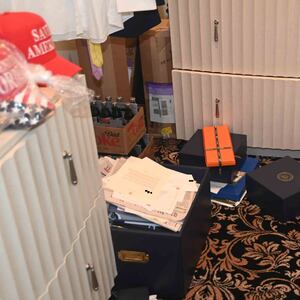In their latest push to toss out evidence in Donald Trump’s classified documents case, the former president’s lawyers complained Tuesday that the 2022 raid at Mar-a-Lago was “overly broad” and violated Trump’s rights because FBI agents dared to enter his son Barron and wife Melania’s rooms.
“Our argument is that agents searched rooms that they had no probable cause to search…And that bears on the question of whether the search was impermissibly broad for Fourth Amendment purposes,” defense attorney Emil Bove said in a Tuesday hearing. “They searched the room where the president’s son kept his Peloton!,” he added, also noting that agents took medical records.
Even Judge Aileen Cannon, the Trump-appointed jurist who has gone to great lengths to tilt the case in Trump’s favor, appeared skeptical about the argument. And, legal experts emphatically dismissed it, telling The Daily Beast that the FBI agents used standard operating procedure while executing the warrant and did not violate Trump’s Fourth Amendment rights.
“In Trump’s case, the warrant did allow agents to search Melania and Barron’s rooms,” former federal prosecutor Neama Rahmani told The Daily Beast. “Trump had access to those rooms and they could have contained classified documents.”
Rahmani explained that all search warrants require particularity and must clearly describe the places investigators intend to search and what type of items will be seized. That means the scope of the warrant depends on the size of the items investigators are looking for—and since classified documents can be found in a room in any small area, authorities had the legal right to search all areas mentioned in the warrant signed by a federal judge.
“Generally, the agents are permitted to look anywhere within the scope of the warrant where the items may be found. Since this is about documents, they could look in drawers because pieces of paper can literally be anywhere,” Todd Foster, a former FBI agent and assistant U.S. Attorney, told The Daily Beast. “If they were looking for machine guns, they wouldn’t be able to look in jewelry boxes.”
“If the room is under the same house, and the warrant authorizes the search of the house, then one could look at any room in the house,” Todd, who is now a Tampa-based attorney, added.
Trump has also claimed in several online screeds that the feds came to Mar-a-Lago with orders to summarily execute him. But prosecutors said, once again, that standard FBI policy governs the use of force while serving search warrants, and warrants have boilerplate language about agents being “armed when on official business.”
In the August 2022 search of Mar-a-Lago, prosecutors say FBI agents found hundreds of classified documents throughout Trump’s country-club-turned-residence, including his bathroom. Trump is facing charges for allegedly illegally hoarding national secrets and obstructing the government’s attempts to get them back.
During a three-day hearing in Florida this week, prosecutor David Harbach argued that agents who executed the search only seized materials that were related to classified information, the government, or presidential duties. He said agents didn’t touch anything in Melania’s or Barron’s rooms, and the medical records that were among boxes of relevant information were returned when discovered.
“It’s not a 4th Amendment violation because there is probable cause that those rooms contained the classified documents,” Rahamni said. “They were moved and hidden all throughout Mar-a-Lago.”
Defense lawyers, however, insisted that the government overstepped their authority. Cannon did not seem convinced. At the end of a two-hour session on Tuesday, Cannon questioned their claim that DOJ officials should have written in the affidavit that the sitting president uniquely does not need security clearance to view sensitive government information.
“But he is post-presidency,” Cannon said about the timing of the FBI raid on Trump’s Florida home, adding that she didn’t see how agents did anything wrong. “I have a hard time seeing what more language is needed.”
As Cannon mulls a ruling on issues raised in the hearing, it’s clear the case will not see a jury until after the presidential election, in which Trump is making a second bid to be commander in chief. One former FBI special agent said Trump’s team was clearly trying to stall by filing a flurry of motions in a Hail Mary move.
“The strategy was to tie up the court as long as possible because they were concerned about the [Republican] convention, and then ultimately the upcoming election in November,” Stuart Kaplan, who is now a criminal and civil defense attorney in Florida and New York, told The Daily Beast.
“They were just trying to hogtie the court system with a flurry of motions so that there was no way that [Judge Cannon] was going to set the trial date. Ironically, she took it out of their control, and she actually said there is going to be no trial at this point.”






